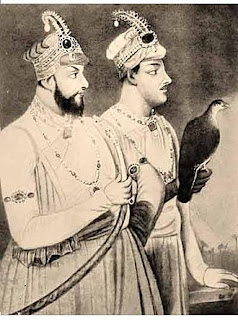 |
| Nawab Siraj-ud daulah,/en.wikipedia. |
 |
| Clive and Mir Jafer after Plassey war.en.wikipedia.org |
In any ruling royal family, be it Maharajah's, Nawab's or a European ruler's, the crucial matter of succession to the throne is a big issue, obviously the royal palace and related places with regal influence, are rife with conspiracies, treason an betrayals. Such decent is part of royal life and the ruler has to tackle this menace carefully in the midst of enjoying the trappings that go with this coveted position. Invariably, the life of a royal head is a tough one wrought with dangers within the family as well as from outside.
 |
| Bengal old map. i.pinimg.com |
On top of it, Siraj-ud-Daulah was at loggerheads with the East India company that got the special trade permit - free from customs duty from the Mogul ruler at Delhi to carry on their mercantile activities in this part. but the dishonest and corrupt British purposely engaged in private trade activities (without the knowledge of the English company in London) and made hefty profits, causing heavy revenue loss to the Nawab's treasury on account of their illegal activites. Besides, the English company, without his consent, began fortification of Ft. William, Calcutta and gave shelter to his opponents.
As the British refused to comply with the trade treaty and kept intimidating the ruler by not respecting his orders, now, Siraj suspected that the English company was ambitious to capture productive Indian lands. Nawab Siraj in 1756 raided Ft. William and took control over it and named the place Alipur. The Black Hole incident took place during this period and the Nawab had anything to do with the death of many English men and women in the dungeon on the Fort complex. In January 1757, Robert Clive, who had emerged victorius in the war against the French and Nana sahib in the Tiruchirapalli region, TN, from Madras and Adm. Charles Watson declared war and recaptured Calcutta from the Nawab.
 |
| quotesgram.com |
 |
| Mir Jafar (left) and his eldest son, Mir Miran (right) en.wikipedia.org |
 |
| Tomb of Siraj ud-Daulah en.wikipedia.org |
The Nawab, to teach a lesson to the unjust English company for not paying taxes, declared war on 23 June 1757 that took place in a place called Plassey (Palashi). As preplanned before, Mir Jafer and others feigned that they were fighting against the British and two thirds of Nawab's Army remained mute spectators. Small forces under Mohan Lal and Mir Mardan were not good enough against the British army who had better artillery power. Mir Mardan was accidentally killed while fighting and things were going against the Nawab though he had a huge army and many canons (mind you, the canons did not have cover against rain, etc). Mi Jafer advised Siraj to retreat to Calcutta and so, the fighting was stopped for the day. At the same time Jaffer informed Clive about Siraj' s retreat to Calcutta. In no matter the British army had a run on the Nawab' s army and marched toward Murshidabad, the capital of Nawab Siraj to take it over.
Siraj, when he came to know of his defeat, was at large and finally went to Patna where he was caught by Mir Jafer's men. Brought back to Murshidabad, on 2 July 1757 Siraj was executed in Namah Haram Deorhi by Mohd. Ali Beg on orders from Mir Miran, son of Mir Jafer. As for Mohanlal, he escaped from this place and went to Juranpur Kali pith, but his son was executed by Miran. His body was buried in Khushbagh in the capital. As for Mir Mardan, close official of Siraj, his mortal remains were in the tomb at Faridpur (Nadia Dist. West Bengal).
 |
 |
| quotesgram.com |
Siraj-ud daulah was the earliest freedom fighter among the royals Saddest thing about this spirited ruler was he was felled down by his own close relatives. That is the edit of God.
https://en.wikipedia.org/wiki/Siraj_ud-Daulah







.jpeg)

